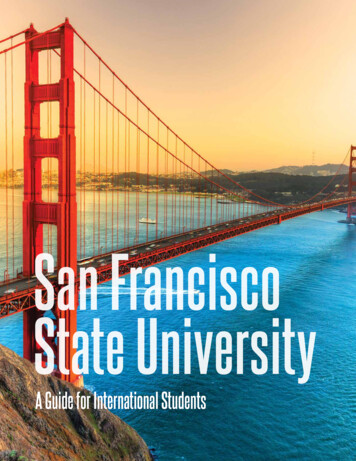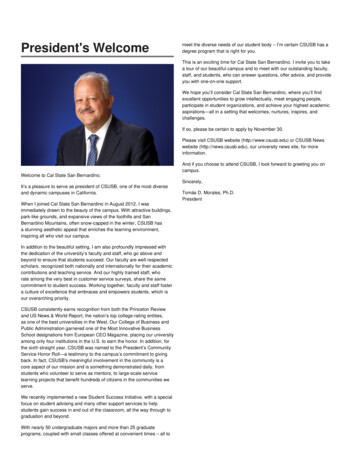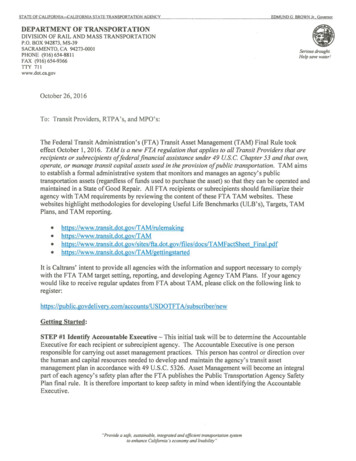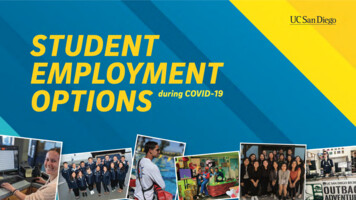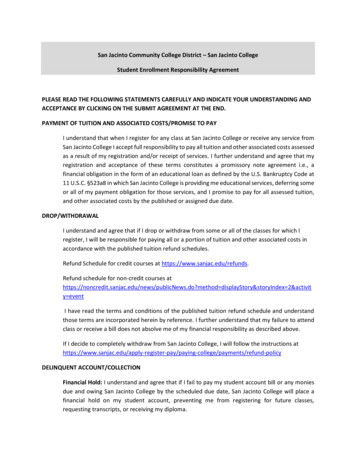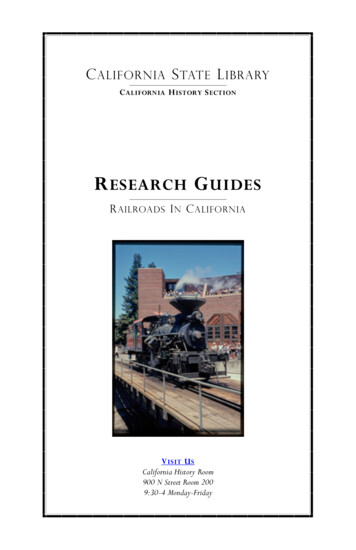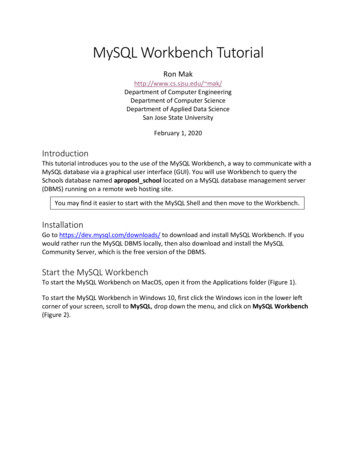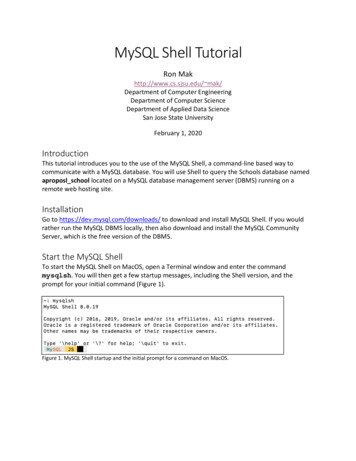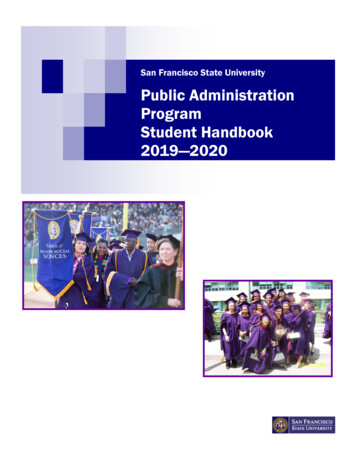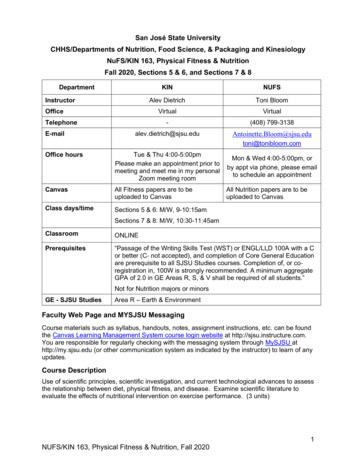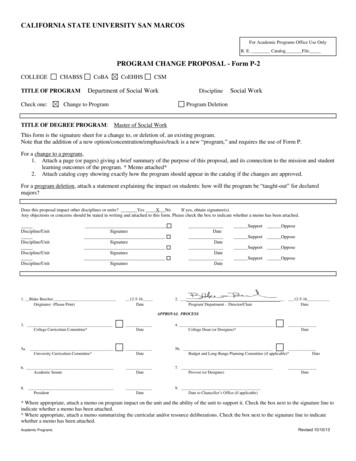
Transcription
CALIFORNIA STATE UNIVERSITY SAN MARCOSFor Academic Programs Office Use OnlyR. E. Catalog FilePROGRAM CHANGE PROPOSAL - Form P-2COLLEGECHABSSTITLE OF PROGRAMCheck one:CoBACoEHHSCSMDepartment of Social WorkChange to ProgramDisciplineSocial WorkProgram DeletionTITLE OF DEGREE PROGRAM: Master of Social WorkThis form is the signature sheet for a change to, or deletion of, an existing program.Note that the addition of a new option/concentration/emphasis/track is a new “program,” and requires the use of Form P.For a change to a program,1. Attach a page (or pages) giving a brief summary of the purpose of this proposal, and its connection to the mission and studentlearning outcomes of the program. * Memo attached*2. Attach catalog copy showing exactly how the program should appear in the catalog if the changes are approved.For a program deletion, attach a statement explaining the impact on students: how will the program be “taught-out” for declaredmajors?Does this proposal impact other disciplines or units?YesX NoIf yes, obtain signature(s).Any objections or concerns should be stated in writing and attached to this form. Please check the box to indicate whether a memo has been ature1. Blake BeecherOriginator (Please ort OpposeSupport OpposeSupport Oppose2.Program/ Department - Director/Chair12-5-16DateAPPROVAL PROCESS3.College Curriculum Committee Date4.College Dean (or Designee)*Date5a.University Curriculum Committee Date5b.Budget and Long-Range Planning Committee (if applicable) Date6.Academic SenateDate7.Provost (or Designee)8.PresidentDate9.Date to Chancellor’s Office (if applicable)Date* Where appropriate, attach a memo on program impact on the unit and the ability of the unit to support it. Check the box next to the signature line toindicate whether a memo has been attached. Where appropriate, attach a memo summarizing the curricular and/or resource deliberations. Check the box next to the signature line to indicatewhether a memo has been attached.Academic ProgramsRevised 10/10/13
Brief Summary & Purpose, Student Learning OutcomesThe social work program has been in existence for 3 years at CSUSM and now has a full complement of fulltime faculty. The faculty members have been reviewing the MSW curriculum content informed by new 2015social work accreditation standards over the past year. In this review process, faculty unanimously agreed thatwe needed to clarify the focus of our program and streamline our curriculum to be consistent with this focus. Itwas also noticed that the content of several classes needed to be clarified and many of the course pre-requisiteswere unnecessarily added, had no educational purpose, and created scheduling difficulties.In accredited MSW programs, the first half of the program is called the generalist or foundation curriculum andmust address the accrediting body’s competencies and generalist practice indicators. The second half of MSWprograms must have at least one area of specialization which also addresses the social work competencies.There are many different areas of specialization (corrections, aging, administration, medical, etc) in MSWprograms and they help direct areas of study but don’t show up on the student’s transcript, aren’t certified ormeaningful at any state or credential level (other than the school social work credential), and don’t necessarilyhelp students find employment based on their area of specialization. The valued degree by employers is theMSW, and areas of specialization frequently aren’t inquired about or helpful for the student in obtainingemployment.Previously, the MSW program at CSUSM had 2 areas of specialization in the 2nd half of the program.Behavioral Health and Children, Youth, and families. Our students selected which specialization(concentration) they were choosing when applying to the program and then in the 2nd year of the program, therewere 3 courses which were specific to the specialization selected. As this was only a 3 course (9 unit) differenceof a total of 60 units, and some of the course content in the specialization courses were similar, this really wasnot a very meaningful difference in which specialization was selected.Based on this information and an assessment of the needs of the local community and consistent with theprogram’s mission statement, faculty decided to change our 2nd year specialization to advanced generalistpractice (AGP). We would then have 3 elective slots (9 units) built into the AGP program which would allowstudents to gain specific knowledge in an area of social work practice (children, youth, and families, behavioralhealth, school social work, veteran services, etc) and the ease of changing and teaching different electiveswould also allow the program to be flexible and nimble in adding content areas which would help serve thelocal community. The AGP area of specialization is also a more accurate reflection of what is actually done inthe program and the skills our students need in this region.Advanced StandingThe MSW program at CSUSM would also like to offer a new program option for qualified students. Advancedstanding is a program option offered to persons who have a Bachelor of Social Work degree from anundergraduate program accredited by the Council on Social Work Education. Undergraduate social workprograms have the same social work competencies as the first half or foundation of the MSW program. Thus,our accrediting body sanctions advanced standing as a program option and many MSW programs across thecountry offer advanced standing to qualified students with a Bachelor of Social Work. Offering advancedstanding also allows us to be more competitive in the regional market. Local MSW programs that offeradvanced standing include: USC, SDSU, Cal Baptist (starting Fall 2017), CSULB, & Azusa Pacific.Essentially, advanced standing allows students to begin the MSW program in the 2nd half of the program (theadvanced curriculum). First year (foundation) courses are waived as students have received equivalent coursecontent in their BSW program. Applicants are expected to have a 3.5 GPA in their undergraduate social workmajor, and a bachelor’s degree in social work awarded no longer than five years before the application date.Applicants would go through the regular admissions process.Office of Academic ProgramsRev.#4 – 3/5/01
Mission of the CSUSM MSW ProgramThe Mission of the Master of Social Work program at California State University San Marcos is to provide anacademic and professional education of the highest quality to students seeking to become committed socialwork professionals engaged in direct social work practice in culturally, economically, and socially diverseurban and rural environments, especially in the Southern California region.The Department of Social Work at CSUSM offers one, two, or three year program plans to obtain the MSWdegree. The program specialization is advanced generalist, which prepares students for a broad scope of practicein a variety of settings. Program emphases are also available in children, youth, and family, and behavioralhealth.The first half (30 units) of the MSW program address foundation or generalist practice, the second half focuseson our area of specialization, advanced generalist practice.Definition of Generalist PracticeGeneralist practice is grounded in the liberal arts and the person-in-environment framework. To promote humanand social well-being, generalist practitioners use a range of prevention and intervention methods in theirpractice with diverse individuals, families, groups, organizations, and communities based on scientific inquiryand best practices. The generalist practitioner identifies with the social work profession and applies ethicalprinciples and critical thinking in practice at the micro, mezzo, and macro levels. Generalist practitionersengage diversity in their practice and advocate for human rights and social and economic justice. Theyrecognize, support, and build on the strengths and resiliency of all human beings. They engage in researchinformed practice and are proactive in responding to the impact of context on professional practice (EPAS2015, p. 11). Generalist practice incorporates all the core competencies.Generalist Core Competencies1. Demonstrate Ethical and Professional Behavior2. Engage Diversity and Difference in Practice3. Advance Human Rights and Social, Economic, and Environmental Justice4. Engage In Practice-informed Research and Research-informed Practice5. Engage in Policy Practice6. Engage with Individuals, Families, Groups, Organizations, and Communities7. Assess Individuals, Families, Groups, Organizations, and Communities8. Intervene with Individuals, Families, Groups, Organizations, and Communities9. Evaluate Practice with Individuals, Families, Groups, Organizations, and CommunitiesCSUSM Definition of Advanced Generalist PracticeAdvanced generalist practice at CSUSM builds on the generalist foundation and increases the depth and breadthof knowledge, skills, and values for effective practice from a multi-level and theoretically sound perspective.Striving for a deep understanding and application of social work that embraces diversity and social justice, theadvanced generalist approach prepares students for self-aware, self-directed and autonomous practice through:1. Advanced knowledge and skills in assessment and evidence-supported intervention methods within ageneralist framework.2. Readiness for interdisciplinary collaboration and leadership in a variety of arenas and practice settings,including program development, coordination, administration and supervision.3. Social action knowledge and skills in policy analysis and development, legislative action, and advocacy.4. Integrated research knowledge and skills that prepare students to evaluate practice, programs, and theevidence supporting specific interventions at all system levels.Office of Academic ProgramsRev.#4 – 3/5/01
5. Advanced knowledge and skills in specific areas of practice (through elective content), such as children,youth and families, behavioral health, and school social work.CSUSM Advanced Standing & 2 Year MSW Curriculum ScheduleYear 1: Foundation Year CoursesFall Semester: 15 UnitsMSW 500Foundations of Social WorkMSW 510Generalist Practice I: IndividualsMSW 520Social Welfare PolicyMSW 525Law and Ethics in Social WorkMSW 540Field Instruction I33333Spring Semester: 15 UnitsMSW 501Human Behavior and the Social EnvironmentMSW 511Generalist Practice II: Families & GroupsMSW 512Generalist Practice III: Organizations and CommunitiesMSW 550Research Methods in Social WorkMSW 541Field Instruction II33333Year 2: Advanced Year Courses [Advanced Standing Courses]Fall Semester: 15 unitsMSW 602Clinical Assessment and Evidence Based TreatmentMSW 629Trauma and AddictionMSW 636Policy and AdministrationMSW 642Advanced Field Instruction IMSW 600-level MSW elective or 695 Thesis I33333Spring Semester: 15 unitsMSW 643Advanced Field Instruction IIMSW 650Program Evaluation and Research MethodsMSW 698Culminating Experience/Thesis IIMSW 600-level MSW electiveMSW 600-level MSW elective33333CSUSM 3 Year MSW Curriculum ScheduleYear 1Fall Semester: 6 unitsMSW 500Foundations of Social WorkMSW 520Social Welfare PolicyOffice of Academic Programs33Rev.#4 – 3/5/01
Spring Semester: 6 unitsMSW 501Human Behavior and the Social EnvironmentMSW 550Research Methods in Social Work33Summer Semester: 6 unitsMSW 512Generalist Practice III: Organizations and CommunitiesMSW 525Law and Ethics in Social Work33Year 2Fall Semester: 9 unitsMSW 510Generalist Practice I: IndividualsMSW 511Generalist Practice II: Families & GroupsMSW 540Field Instruction I333Spring Semester: 9 unitsMSW 602Clinical Assessment and Evidence Based TreatmentMSW 600-level MSW electiveMSW 541Field Instruction II333Summer Semester: 6 unitsMSW 650Program Evaluation and Research MethodsMSW 600-level MSW elective or 695 Thesis I33Year 3Fall Semester: 9 unitsMSW 629Trauma and AddictionMSW 636Policy and AdministrationMSW 642Advanced Field Instruction I333Spring Semester: 9 unitsMSW 698Culminating Experience/Thesis IIMSW 600-level MSW electiveMSW 643Advanced Field Instruction II333There is no change in credit hours for students and there are no additional budget costs to any of thesecurriculum changes.Foundation Curriculum Changes (1st half of the program- 5XX numbered courses)Changes to foundation courses (as reflected in the c-2 forms) have been made to better reflect our new studentlearning outcomes consistent with the 2015 accreditation guidelines, remove unnecessary prerequisites, and toclarify what is covered in each course.Office of Academic ProgramsRev.#4 – 3/5/01
The previous MSW 500 and MSW 501 covered similar content but were broken up by age group (500 covereddevelopment from conception through adolescence and MSW 501 covered development from young adulthoodthrough death. Now the new MSW 501 covers all of the development content in one class (conception-death)The new MSW 500 Foundations of Social Work is a revised course which introduces students to core socialwork roles, ethics, practice models, and skills within a diversity framework.Advanced Curriculum Changes (2nd half of the program 6XX numbered courses)Changes to advanced courses (as reflected in the c-2 forms) have been made to better reflect our new studentlearning outcomes consistent with the 2015 accreditation guidelines, remove unnecessary prerequisites, and toclarify what is covered in each course.Two new 3 unit courses were added also to the required advanced curriculum (plus one 3-unit elective slot) and3 courses which were previously required will be moved to elective status. The 2 new courses are MSW 629Trauma and Addiction and MSW 636 Policy and Administration (see the c-forms for each course).The previously required courses which will now switch to elective status are:MSW 630A Advanced Direct Practice I: Individuals /CYF (3) Direct practice with children, youth, andfamilies, related to individual functioning and interpersonal interactions. Various theoretical approaches.Ecological systems framework with additional focus on multicultural issues.MSW 631A Advanced Direct Practice II: Groups & Families /CYF (3) Advanced direct practice skills forworking with individuals, families, and groups in children, youth, and families settings. Family and grouptreatment models. Assessments and interventions with an emphasis on cultural competency.MSW 635A Advanced Policy: CYF (3) Social welfare policy for children, youth, and families in the U.S.Children’s policies in education, mental health, and juvenile justice. Specific focus on policies in child welfare,inclusive of permanency planning, kinship care, and family preservation.MSW 630B Advanced Direct Practice I: Individuals /BH (3) Direct practice course working with individualsin behavioral health settings. Various theoretical approaches. Emphasis on integrated care, and the recoveryparadigm in mental health services. Additional focus on multicultural issues.MSW 631B Advanced Direct Practice II: Groups & Families /BH (3) Direct practice skills for working withindividuals, families, and groups in behavioral health settings. Family and group treatment models. Assessmentsand interventions with an emphasis on cultural competency.MSW 635B Advanced Policy: BH (3) Development of behavioral health policy in the U.S, and its relationshipto the delivery of behavioral health services for various populations across the life span. Focus on diversityissues in behavioral health policy.Additional Clarification regarding the changes to MSW 698MSW 698 Capstone/Thesis II was a course which prepared students to complete a capstone project or workwith a thesis advisor to complete a thesis. The MSW program has made a change to the culminating experienceand MSW students will now be completing a thesis or taking a comprehensive exam for the culminatingexperience in the MSW program. Since the preparation for these outcomes will be different, MSW 698 wassplit into 2 different courses, MSW 698 A Culminating Experience: Comprehensive Exam, and MSW 698 BCulminating Experience: Thesis II.Office of Academic ProgramsRev.#4 – 3/5/01
MSW 698 A will be a seminar course and will focus on integrating student content and learning over the courseof the MSW program and address topics and activities to assist students to be successful in professionalpractice. Students will do licensure preparation activities including practice tests, which will also help preparestudents to be successful in the comprehensive exam. Two texts will assist with this process and containpractice exams and integrative activities.MSW 698 B is a course taught on a one-on one basis and will be taught by the Thesis Chair. The chair willassist a student in successfully completing a thesis project.The previous MSW 698 Class will be phased out as it will no longer be needed.How Catalog Will Appear If Changes Are ApprovedCatalog p. 183 (Program Description Section)MASTER OF SOCIAL WORK * offered through extended learningOffice:University Hall, Room 321, ChairUniversity Hall, Room 321, Administrative SupportTelephone:(760) 750-7373Department Chair:Blake Beecher, MSW, Ph.D., ChairFaculty:Leandro Galaz, MSWJeannine Guarino, LCSW, Co-Field Field DirectorLorene Ibbetson, MSW, Co-Field Director Title IV-E Program DirectorMadeline Lee, MSSW, Ph.D.Jacky Thomas, MSW, Ph.D.Jimmy Young, MSW, MPA, Ph.D.Program Offered: Master of Social Work, Concentrations in: - Children, Youth, and Families Concentration - Behavioral Health(BH) ConcentrationProgram Emphases in:- Children, Youth, and Families- Behavioral Health (BH)The Master of Social Work (MSW) program at CSUSM is designed to develop culturally competent, ethical,and effective professionals for direct social work practice with diverse populations. Students choose fromconcentrations in Children, Youth, and Families, and Behavioral Health in their advanced year. The MSWprogram will prepares students for direct practice in a variety of settings including public, private, and nonprofitagencies and organizations, in social services, child welfare services, human services, healthcare, and mentalhealth settings /behavioral health.MissionOffice of Academic ProgramsRev.#4 – 3/5/01
The Mission of the Master of Social Work program at California State University San Marcos is to provide anacademic and professional education of the highest quality to students seeking to become committed socialwork professionals engaged in direct social work practice in culturally, economically, and socially diverse urbanand rural environments, especially in San Diego and Riverside Counties and the Southern California region.The program’s concentrations focus on serving the needs of children, youth, and families, and caring for thebehavioral health needs of individuals and families in our communities.The MSW program specialization is advanced generalist, which prepares students for a broad scope of practicein a variety of settings. Program emphases are also available in children, youth, and family, and behavioralhealth.Working primarily in public, private, and nonprofit agencies, MSW graduates help culturally-diverseindividuals, families, organizations, and communities recognize their strengths, access needed resources, andempower themselves to reach their goals and potential. improve functioning, and reach their goals and fullpotential.Program GoalsThe following six program goals are based upon the mission of the MSW program. These goals are intended tofurther operationalize the mission and are applicable to both the foundation and advanced concentrationcurriculum.The MSW program will produce social work graduates who:1. Are equipped with relevant research, knowledge, skills, and eth
Office of Academic Programs Rev.#4 – 3/5/01 Mission of the CSUSM MSW Program The Mission of the Master of Social Work program at California State University San Marcos is to provide an academic and professional education of the highe
